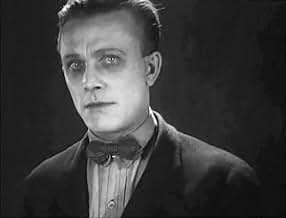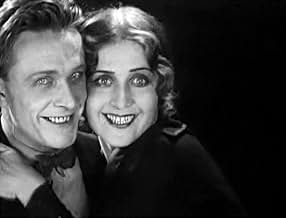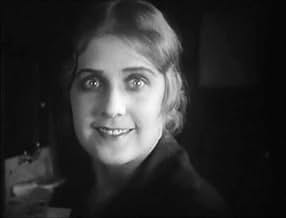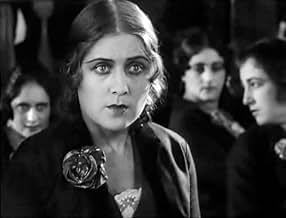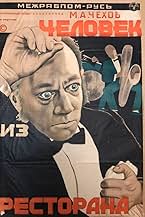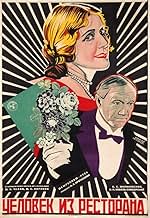Füge eine Handlung in deiner Sprache hinzuAn elderly man works as a waiter at a luxurious restaurant. He's content and full of hope, and treasures his family more than anything. But it's time of the First World War and news from the... Alles lesenAn elderly man works as a waiter at a luxurious restaurant. He's content and full of hope, and treasures his family more than anything. But it's time of the First World War and news from the front change his life.An elderly man works as a waiter at a luxurious restaurant. He's content and full of hope, and treasures his family more than anything. But it's time of the First World War and news from the front change his life.
- Regie
- Drehbuch
- Hauptbesetzung
Vera Malinovskaya
- Natasha
- (as V. Malinovskaya)
Andrey Petrovsky
- The General
- (as A. Petrovsky)
Mark Prudkin
- Officer
- (Nicht genannt)
Sergei Tsenin
- Officer
- (Nicht genannt)
Empfohlene Bewertungen
Not the most accomplished of Jacov Protazanov's movies, this one takes a while to work up to a passably melodramatic climax.
The earlier stages pile on the agony with put-upon waiter Michael Chekhov seeing his wife and soldier son victims of World War One, leaving him with only his (thirty something) school girl daughter dismissed from college but found a spot in the all girl orchestra which plays in his restaurant. There the customers are profiteers and uniformed military officers. The plot develops the seeds of DARK EYES with the waiter finding his own daughter is to be the victim of the business man's lust full attentions at the event he is catering.
There is a bit of Soviet montage editing in the insets of the kitten playing with the ball of wool in the grim moment and the one note performances are effective - particularly Mikhail Narokov's leering manufacturer. Chekkov was already an accomplished performer before he went to Hollywood and the camera-work is by Pudovkin's regular photographer.
The You Tube sub titled copy runs too fast and has fair picture quality.
The earlier stages pile on the agony with put-upon waiter Michael Chekhov seeing his wife and soldier son victims of World War One, leaving him with only his (thirty something) school girl daughter dismissed from college but found a spot in the all girl orchestra which plays in his restaurant. There the customers are profiteers and uniformed military officers. The plot develops the seeds of DARK EYES with the waiter finding his own daughter is to be the victim of the business man's lust full attentions at the event he is catering.
There is a bit of Soviet montage editing in the insets of the kitten playing with the ball of wool in the grim moment and the one note performances are effective - particularly Mikhail Narokov's leering manufacturer. Chekkov was already an accomplished performer before he went to Hollywood and the camera-work is by Pudovkin's regular photographer.
The You Tube sub titled copy runs too fast and has fair picture quality.
Ivan Sergeevich Shmelev (1873-1950) was a beloved author of many books about pre-Revolutionary Russia and its Orthodox Christian way of life, fanatically attacked by the demonic forces of Communism. His original story "The Man from The Restaurant" was a sympathetic look at regular people of that earlier time, written in 1910, YEARS BEFORE the Anti-Russian Revolution of 1917. He had absolutely nothing in it of the propaganda that the agents of Bolshevik terror twisted it into in 1927.
..... Shmelev's son was executed by the Communists in 1920 in Crimea, and the author hated Communism. There is no way he would have ever written the travesty of this movie plot, which gives a Communist propaganda view.
...... Here is a complaint published in a newspaper, written by the author himself in the early 1930s, against the perversion of this film: (translated by me):
PROTEST OF IVAN SHMELEV
We received a request to print the following letter from Ivan. S. Shmelev: "I have learned from newspapers that, following after the cinemas of Germany and Latvia, there will soon be shown on the French screen a film, reworked from my novel "The Man from the Restaurant". Therefore I consider necessary once again to address the public with the following statement: I. I did not give to anyone in the USSR the right to recast my novel for a movie. The right of worldwide screen production of "The Man" was acquired from me in the autumn of last year by the Berlin impresario Borkon on condition that a foreign cinematographic company will produce the film, and the scenario will be presented to me for viewing, wherein Borkon was obligated not to transfer the rights acquired by him for "The Man" to Soviet business operators. II. What the Soviet Mezhrabpom Rus (["Workers' International Aid, Russia") did with my "The Man", with the participation of several actors of the Soviet Art Theater in Moscow, "has no name", as the well-known writer Peter Pil'sky (newspaper Tonight, dated January 18 writes in the article "Literary films in Riga": "for even the most shameful and stigmatizing words are powerless to communicate this violence against the entire scope, idea, plot, and even common sense. Sovkino (Soviet Film organization) most controversially, turned Shmelev's story, and made of it an openly brazen propaganda forgery". To represent the "foulness of the bourgeois system", the Bolsheviks used the popularity of the novel that had been translated, by the way, also into French, and transferred the action to 1916-17. In the meantime, since the novel had been written in 1910, they perverted the idea of the novel, and in the interests of propaganda thought up their own contents, changed the destinies and characters of the dramatis personae, and filled everything with lies, filth, and platitudes in glory of Leninism and in mockery of the "dissolute bourgeoisie and Tsarist military officers", and in glorification of the "perishing proletariat of wounded poor people", and so forth. "By calculation of the director," affirms P.M. Pilsky in the article, "the heart of the viewer must tighten and be filled with great indignation against the 'mean-spirited' system... For the sake of this, Shmelev was a sacrificial victim. Even from responses of the Soviet reviewers who have appeared for this time as more discerning in literary relations than certain actors of the wonderful theater led by the Leonidovs, who assisted this way in perverting the novel well-known to them, by a Russian writer well-known to them - even, I repeat, from responses of the Soviet reviewers of "Moek. Izvestiia" of August 21, and "Krasn. Niva" -- "Shmelev's story was subjected to 'radical recasting'". "In the subject, i.e., in that main thing for the sake of which the story is written, there is no contact between the cinema and Shmelev's story, and the very plot of the picture, having almost nothing coinciding with the plot of the story, turned out to be a typical melodrama..." III. Thus, this "recasting" and showing it all over the world is a violation against a Russian writer and against the spirit of his work, and is an impudent deception in order to incite class hatred in Europe and all over the world and a malicious attempt to bring to life even more lies and evil. And the deceivers are trying to reinforce this worst deception by the authority of the work, which has absolutely nothing in common either with evil or with the lie. The brazenness of the Soviet business operators has even reached such as level that in their clamorous advertising, near my name and the name of my work they print also my distorted portrait, reworked by some unknown means. I will fight, as far as it is in my strength, with all lawful means against similar deception and violation. I request that the Russian foreign publications provide space for my announcement.
We received a request to print the following letter from Ivan. S. Shmelev: "I have learned from newspapers that, following after the cinemas of Germany and Latvia, there will soon be shown on the French screen a film, reworked from my novel "The Man from the Restaurant". Therefore I consider necessary once again to address the public with the following statement: I. I did not give to anyone in the USSR the right to recast my novel for a movie. The right of worldwide screen production of "The Man" was acquired from me in the autumn of last year by the Berlin impresario Borkon on condition that a foreign cinematographic company will produce the film, and the scenario will be presented to me for viewing, wherein Borkon was obligated not to transfer the rights acquired by him for "The Man" to Soviet business operators. II. What the Soviet Mezhrabpom Rus (["Workers' International Aid, Russia") did with my "The Man", with the participation of several actors of the Soviet Art Theater in Moscow, "has no name", as the well-known writer Peter Pil'sky (newspaper Tonight, dated January 18 writes in the article "Literary films in Riga": "for even the most shameful and stigmatizing words are powerless to communicate this violence against the entire scope, idea, plot, and even common sense. Sovkino (Soviet Film organization) most controversially, turned Shmelev's story, and made of it an openly brazen propaganda forgery". To represent the "foulness of the bourgeois system", the Bolsheviks used the popularity of the novel that had been translated, by the way, also into French, and transferred the action to 1916-17. In the meantime, since the novel had been written in 1910, they perverted the idea of the novel, and in the interests of propaganda thought up their own contents, changed the destinies and characters of the dramatis personae, and filled everything with lies, filth, and platitudes in glory of Leninism and in mockery of the "dissolute bourgeoisie and Tsarist military officers", and in glorification of the "perishing proletariat of wounded poor people", and so forth. "By calculation of the director," affirms P.M. Pilsky in the article, "the heart of the viewer must tighten and be filled with great indignation against the 'mean-spirited' system... For the sake of this, Shmelev was a sacrificial victim. Even from responses of the Soviet reviewers who have appeared for this time as more discerning in literary relations than certain actors of the wonderful theater led by the Leonidovs, who assisted this way in perverting the novel well-known to them, by a Russian writer well-known to them - even, I repeat, from responses of the Soviet reviewers of "Moek. Izvestiia" of August 21, and "Krasn. Niva" -- "Shmelev's story was subjected to 'radical recasting'". "In the subject, i.e., in that main thing for the sake of which the story is written, there is no contact between the cinema and Shmelev's story, and the very plot of the picture, having almost nothing coinciding with the plot of the story, turned out to be a typical melodrama..." III. Thus, this "recasting" and showing it all over the world is a violation against a Russian writer and against the spirit of his work, and is an impudent deception in order to incite class hatred in Europe and all over the world and a malicious attempt to bring to life even more lies and evil. And the deceivers are trying to reinforce this worst deception by the authority of the work, which has absolutely nothing in common either with evil or with the lie. The brazenness of the Soviet business operators has even reached such as level that in their clamorous advertising, near my name and the name of my work they print also my distorted portrait, reworked by some unknown means. I will fight, as far as it is in my strength, with all lawful means against similar deception and violation. I request that the Russian foreign publications provide space for my announcement.
During the good old days of the Russian aristocracy, that is to say, before the October Revolution, in the city of Moscow there was a fancy restaurant which catered to the appetites and egos of the rich.
In one such establishment works a middle-aged waiter who is devoted to serving his bourgeoisie clients correctly. However, his life outside his job is very different: His son was killed during the Russian civil war and the waiter's wife died of grief as a result. The waiter's daughter is a beautiful schoolgirl but she has to drop out of school because of her father's financial problems. The waiter is obliged to rent a room in his small apartment. The young man who applies for it quickly falls in love with the daughter. The waiter finds a job as a violinist for his daughter in his restaurant (vive le nepotism!) but there she attracts the unwanted attentions of a middle aged factory owner who has lecherous designs on her.
"Chelovek Iz Restorana" ( Man From The Restaurant ) (1927) was directed by the prolific Russian film director Herr Yakov Protazanov, a very interesting film wherein different subjects are subtly outlined and put together in an understated and skillful way.
For example, the film depicts the different sides of Russian society before the Revolution; inside the restaurant exists a world of opulence and excess but outside that artificial atmosphere injustice reigns. Indeed even within the restaurant life is hard for the employees so the need for a union arises. The upper classes are depicted as corrupt and this point is brought home by the behavior of the factory owner who steals secret war documents and blackmails the waiter's daughter by threatening to frame her boyfriend (the tenant) for his crime.
These complicated situations will converge "in crescendo climax" wherein Herr Protazanov pulls together every dramatic element of the story with its opposing class forces until he reaches a frenzied finale in which justice and dignity finally triumph.
And now, if you'll allow me, I must temporarily take my leave because this German Count is going to a fancy Muscovite restaurant with one of his rich Teutonic heiress (who of course will pay the bill) Herr Graf Ferdinand Von Galitzien http://ferdinandvongalitzien.blogspot.com/
In one such establishment works a middle-aged waiter who is devoted to serving his bourgeoisie clients correctly. However, his life outside his job is very different: His son was killed during the Russian civil war and the waiter's wife died of grief as a result. The waiter's daughter is a beautiful schoolgirl but she has to drop out of school because of her father's financial problems. The waiter is obliged to rent a room in his small apartment. The young man who applies for it quickly falls in love with the daughter. The waiter finds a job as a violinist for his daughter in his restaurant (vive le nepotism!) but there she attracts the unwanted attentions of a middle aged factory owner who has lecherous designs on her.
"Chelovek Iz Restorana" ( Man From The Restaurant ) (1927) was directed by the prolific Russian film director Herr Yakov Protazanov, a very interesting film wherein different subjects are subtly outlined and put together in an understated and skillful way.
For example, the film depicts the different sides of Russian society before the Revolution; inside the restaurant exists a world of opulence and excess but outside that artificial atmosphere injustice reigns. Indeed even within the restaurant life is hard for the employees so the need for a union arises. The upper classes are depicted as corrupt and this point is brought home by the behavior of the factory owner who steals secret war documents and blackmails the waiter's daughter by threatening to frame her boyfriend (the tenant) for his crime.
These complicated situations will converge "in crescendo climax" wherein Herr Protazanov pulls together every dramatic element of the story with its opposing class forces until he reaches a frenzied finale in which justice and dignity finally triumph.
And now, if you'll allow me, I must temporarily take my leave because this German Count is going to a fancy Muscovite restaurant with one of his rich Teutonic heiress (who of course will pay the bill) Herr Graf Ferdinand Von Galitzien http://ferdinandvongalitzien.blogspot.com/
Wusstest du schon
Top-Auswahl
Melde dich zum Bewerten an und greife auf die Watchlist für personalisierte Empfehlungen zu.
Details
- Erscheinungsdatum
- Herkunftsland
- Sprachen
- Auch bekannt als
- Der Kellner aus dem Palast-Hotel
- Produktionsfirma
- Weitere beteiligte Unternehmen bei IMDbPro anzeigen
- Laufzeit1 Stunde 2 Minuten
- Farbe
- Sound-Mix
- Seitenverhältnis
- 1.33 : 1
Zu dieser Seite beitragen
Bearbeitung vorschlagen oder fehlenden Inhalt hinzufügen

Oberste Lücke
By what name was Chelovek iz restorana (1927) officially released in Canada in English?
Antwort
